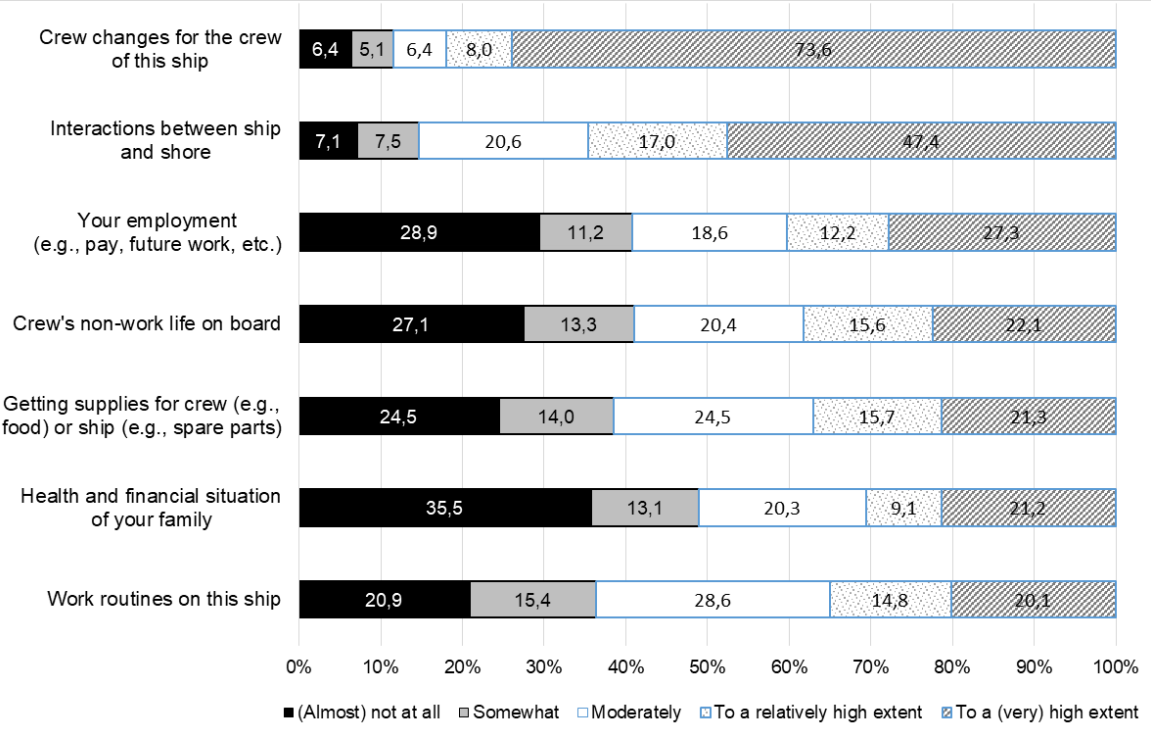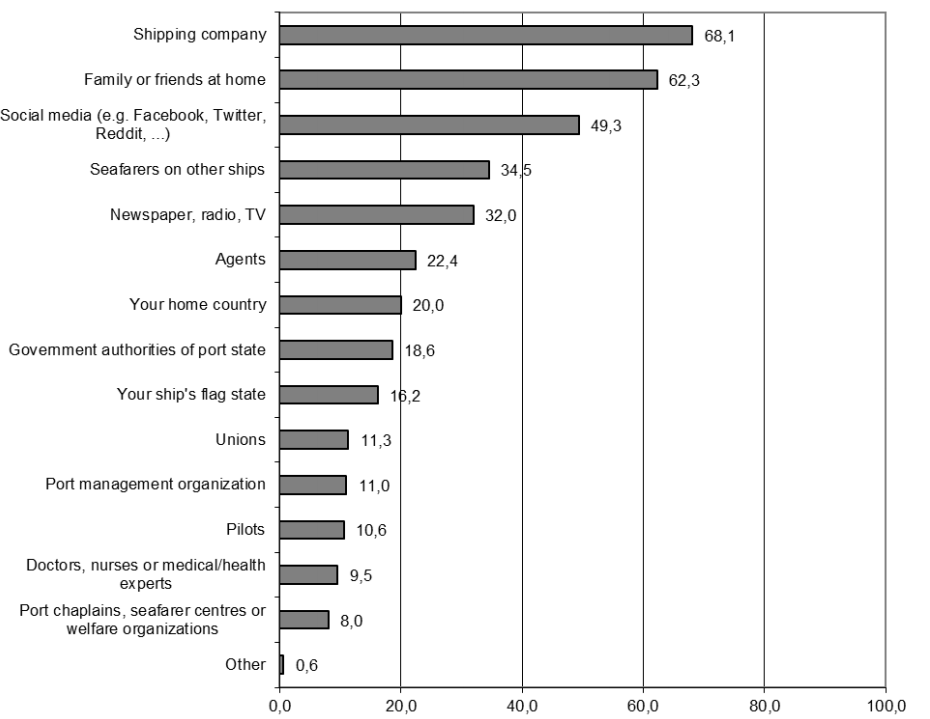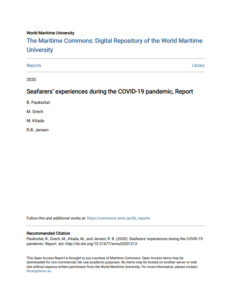The World Maritime University issued a report focusing on the experiences of seafarers during the COVID-19 pandemic, addressing the challenges they face and identify factors that may mitigate the negative impact of the pandemic.
- The majority of respondents reported serious impacts of the pandemic on crew changes and ship-shore interactions. Respondents’ experiences varied with regard to the extent to which the
pandemic had affected their employment, non-work life on board and access to supplies. Almost half of the respondents reported an increase in workload in comparison to their workload
prior to the pandemic. - On average respondents felt less safe in port than at sea.
- The main difficulties and challenges reported by survey respondents concerned crew changes, ship-shore interactions (incl. lack of shore leave and difficulties in getting supplies), the situation on board (e.g., high workload, fatigue, conflicts, tensions), and lack of information and support from the shipping company.
- There was a 50/50 split in responses between those who reported receiving “a lot” and “enough” support and those who did not. Main sources of support identified by respondents’ were shipping companies, family and friends at home and social media.
- Over 40% of the respondents indicated that they had experienced symptoms of depression several times, almost every day or every day during the past seven days, whereas over half reported symptoms of anxiety. Moreover, on average, respondents had experienced symptoms of exhaustion between “once” and “several times” during the past seven days. Feeling exhausted, tired and having sleeping problems were most common, and were experienced by over half of the respondents “several times” or more frequently during the past seven days.
The seafarers surveyed where asked how the COVID-19 pandemic affected different aspects of work and life on board, their family and their employment.
20% of respondents reporting a very high or high impact in each of these areas. By far the most seriously affected area, according to survey responses, were crew changes, followed by ship-shore interactions.

the percentage of respondents who chose a particular answer category.
The survey also included questions on the current workload of respondents and the crew as a whole, compared to the workload before the pandemic.
47.8% of respondents reported of an increase of workload, and that of their crew, 48.2%.
46.6% reported that their workload had remained “about the same”; crew: 44.7%.
5.2% of the respondents reported that they experienced a decrease in their workload. 6.6% of their crew.
Concerning the effects on their personal safety.
42.2% did not feel safe during port calls.
84.7%agreed that they “felt safe while the ship was at sea”.

Respondents were asked to name three main COVID-19 related difficulties or challenges they had faced in the last seven days. The answers include:
- Crew changes: Respondents highlighted limitations, cancellations, delays or difficulties with crew changes as a major challenge. Some responses were more detailed, noting for instance
the uncertainty around crew changes (especially regarding crew change dates) and difficulties related to travelling to/from the ship due to visa restrictions, border closures, quarantine requirements, flight cancellations, diversity of rules (in some cases even within the same country), and changing rules. - Ship-shore interactions: Over half of the respondents mentioned challenges related to shipshore interactions. This included not being able to go ashore (mentioned by 34.5%). Getting supplies was mentioned as a key challenge by 13.3%.
- Policies: Challenges related to policies were mentioned by 23.1% of respondents. Some statements specifically concerned policies in connection with crew changes (e.g., visa requirements, quarantine rules) while most related to port states’ requirements and regulations as well as COVID-19 precautions taken by the crew during port calls.
The report highlights that
A frequently mentioned challenge was non-compliance with rules by others with whom crew members interacted. Others mentioned situations when policies were difficult or impossible to implement.
-

Main sources of support since the start of the pandemic. Numbers show
the percentage of respondents who chose a particular answer category; respondents
could select multiple categories if they wished.Lack of support from the shipping company: Almost a quarter of the respondents (23.3%) mentioned challenges concerning the perceived lack of support from the shipping company, such as lack of information, conflicting information, lack of communication, or high demands and pressure. Moreover, many respondents mentioned challenges related to expired or extended contracts (12.5%) or challenges related to financial problems and job insecurity (7.1%). Due to the difficulty of crew changes, some noted that their companies extended contracts instead of offering timely crew changes.
- Challenges concerning the situation on board were mentioned by 36.6%. This included increased workload, fatigue due to high workload and extended contracts, and dealing with stress and negative emotions such as fear, anxiety, uncertainty, feeling locked-in on board, as well as tensions and aggression among the crew. Captains and senior officers also noted challenges with regard to passing on unpleasant news and explaining the situation to the crew.
- Risk of COVID-19 infections: For 15.4% of respondents, a key challenge was the risk of COVID-19 infections. Many worried about being exposed to the virus. Most commonly,
this was mentioned in relation to non-crew members that they might come in contact with during port calls, but also in connection with incoming crew members. - Situation at home: Concerns about the situation at home were mentioned as a key challenge by 10.4%. This included concerns about family matters, the health and/or the financial situation of their family, as well as the situation in their home country. Limited or difficult communication with friends and family at home were mentioned as well. For some, a key challenge was that Internet or other means of communication were expensive, slow or hardly available at all.
- Implement effective protective measures and ensure the provision of medical care
- Ensure that viable repatriation plans are in place
- Provide free, fast and reliable Internet on board for seafarers’ personal use
- Ensure that seafarers have access to essential supplies and support when needed, including medical care, mental health support, essential goods, as well as possibilities for shore leave
- Ensure a fatigue risk management system is in place
Governments should:
- Recognise seafarers as key workers to facilitate crew changes, allow shore leave and provide access to shore-based services.
- Ensure vessels’ continued compliance with international laws and regulations, such as the Maritime Labour Convention (MLC, 2006) and Safety of Life at Sea Convention (SOLAS)
- Continue consultation and co-operation between social partners. Under exceptional circumstances, consideration for exempting aspects of MLC, 2006 provisions should include consultation with seafarers or their representatives to ensure all safe options are considered.
Concluding, you may learn more by clicking on the study herebelow



































































